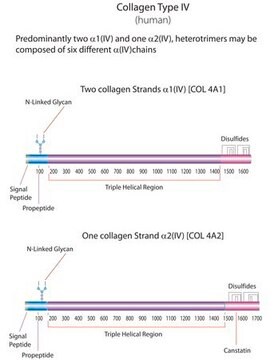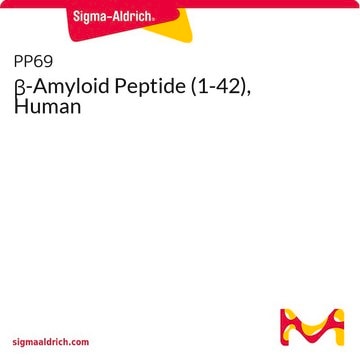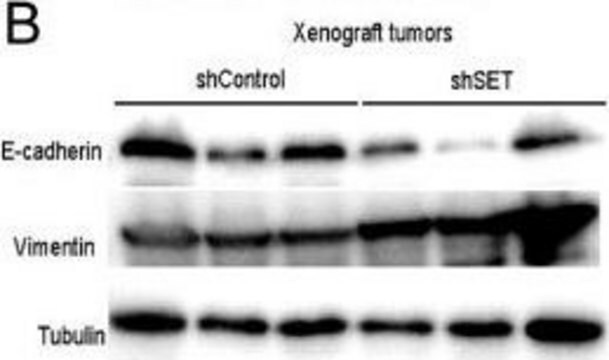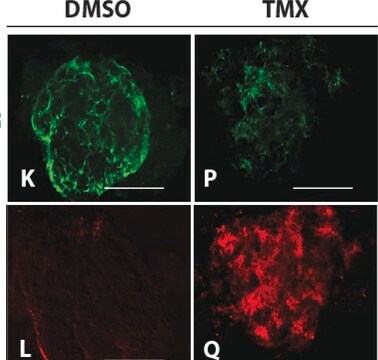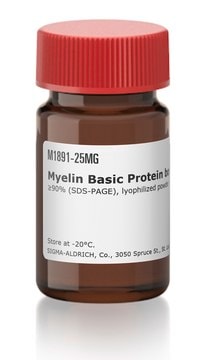GF181
Vimentin, Human Recombinant
Sinónimos:
VIM
Iniciar sesiónpara Ver la Fijación de precios por contrato y de la organización
About This Item
Código UNSPSC:
12352202
eCl@ss:
32160405
NACRES:
NA.75
Productos recomendados
Descripción general
Product Source: Protein is expressed in E.coli.
Vimentin is a class III intermediate filament protein predominantly found in cells of mesenchymal origins, such as vascular endothelium and blood cells, where it functions as a major cytoskeletal component. Due to its importance and abundance in the cytoskeletal structure of mesenchymally-derived cells, Vimentin is frequently used as a developmental marker within cells of mesenchymal origin or cells undergoing epithelial-mesenchymal transition, which can occur during both normal and metastatic growth. An active participant within several critical processes of cellular organization and protein regulation, Vimentin is involved in the anchorage of organelles within the cytoplasmic matrix, development of astrocytes, and the disassembly of cellular components during the execution phase of apoptosis. Abnormalities in the normal physiological pathways of Vimentin have been implicated in deficient motility and directional migration involved in wound healing and cellular growth and development, as well as the adhesion-site accumulation of Vimentin on lens epithelial cells in cases of dominant cataracts.
Aplicación
Research Category
Stem Cell Research
Stem Cell Research
Research Sub Category
Growth Factors & Receptors
Growth Factors & Receptors
Forma física
Product is presented without additives and is filtered through a 0.2 micron filter before lyophilization.
Almacenamiento y estabilidad
Store at -20°C for up to 4 months from date of receipt Centrifuge the vial prior to opening.
Reconstitute in water to a concentration of 0.1-1.0 mg/ml. Do not vortex. For extended storage, it is recommended to further dilute in a buffer containing a carrier protein and store in working aliquots at -20°C.
Reconstitute in water to a concentration of 0.1-1.0 mg/ml. Do not vortex. For extended storage, it is recommended to further dilute in a buffer containing a carrier protein and store in working aliquots at -20°C.
Cláusula de descargo de responsabilidad
Unless otherwise stated in our catalog or other company documentation accompanying the product(s), our products are intended for research use only and are not to be used for any other purpose, which includes but is not limited to, unauthorized commercial uses, in vitro diagnostic uses, ex vivo or in vivo therapeutic uses or any type of consumption or application to humans or animals.
Código de clase de almacenamiento
11 - Combustible Solids
Clase de riesgo para el agua (WGK)
WGK 1
Punto de inflamabilidad (°F)
Not applicable
Punto de inflamabilidad (°C)
Not applicable
Certificados de análisis (COA)
Busque Certificados de análisis (COA) introduciendo el número de lote del producto. Los números de lote se encuentran en la etiqueta del producto después de las palabras «Lot» o «Batch»
¿Ya tiene este producto?
Encuentre la documentación para los productos que ha comprado recientemente en la Biblioteca de documentos.
Chih-Ming Tsai et al.
Journal of innate immunity, 12(4), 333-343 (2019-12-06)
Pathogenic microorganisms are sensed by the inflammasome, resulting in the release of the pro-immune and proinflammatory cytokine interleukin-1β (IL-1β). In humans, the paired <underline>s</underline>ialic acid-binding Ig-like lectin receptors Siglec-5 (inhibitory) and Siglec-14 (activating) have been shown to have reciprocal roles
Nuestro equipo de científicos tiene experiencia en todas las áreas de investigación: Ciencias de la vida, Ciencia de los materiales, Síntesis química, Cromatografía, Analítica y muchas otras.
Póngase en contacto con el Servicio técnico
